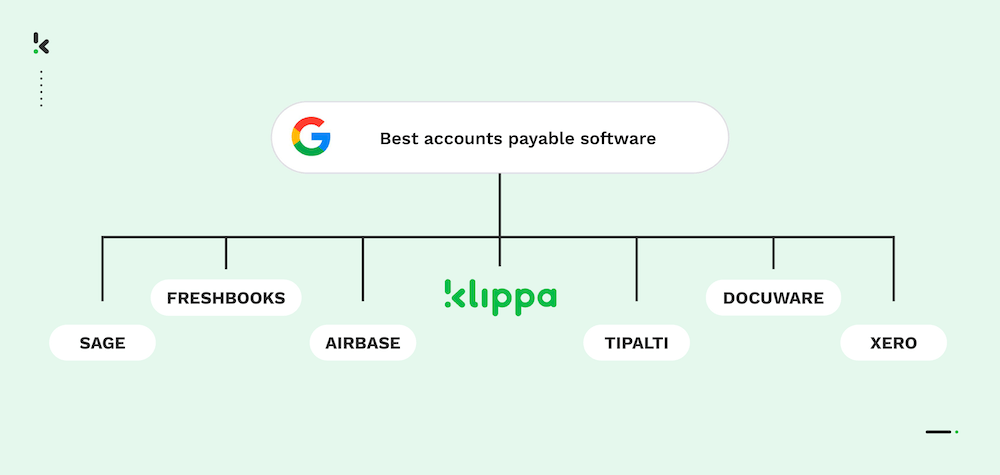

Goldman Sachs’s recent study showcased that automating your accounts payable process through digital software can save up to $16 for each invoice and about 80% of overall invoice processing time. This leaves no doubt that AP software resolves many hassles that take over the precious time of your financial team.
In this blog, we’ll take a closer look at some of the best accounts payable software on the market today. Whether you’re a small business owner or a finance professional working for a large corporation, you’ll find valuable insights to help you choose the best software for your needs.
Comparison of the best accounts payable software platforms in 2025:
What is Accounts Payable Software?
Accounts payable (AP) software is a tool that automates and manages a company’s process of handling incoming invoices and outgoing payments. It streamlines tasks such as capturing invoice data, validating amounts, obtaining necessary approvals, and executing payments.
The AP software reduces manual data entry, minimizes errors, protects from AP fraud and ensures timely payments, enhancing cash flow management and vendor relations within the accounts payable process.
By integrating with accounting and ERP systems, AP software ensures that financial records are accurate and up-to-date. It also provides essential reporting for audit trails and compliance, making it a critical component for efficient and accurate financial management in any organization. Using the accounts payable software is one of the best practices in AP.
The 7 Best AP Software Platforms in 2025
1. Klippa SpendControl
Klippa SpendControl is an all-in-one digital pre-accounting software that combines invoice processing, expense management, and corporate credit card modules.
Our software utilizes Optical Character Recognition (OCR) technology to ensure accurate data capture and enable invoice scanning, approval, archiving, and booking directly to your financial administration.
Pros
- Manage your vendor invoices, employee expenses, and corporate credit cards in one platform
- Submit, process, and approve invoices via web or mobile app
- Achieve 99% invoice data extraction accuracy with Klippa’s OCR
- Regain control over your accounts payable with intuitive dashboards
- Customize your approval management with multi-level authorization flows
- Never fail to comply with tax and data privacy regulations with our ISO27001-certified and GDPR-compliant solution
- Rely on automatic multi-currency support for international payments
- Prevent invoice fraud with built-in duplicate and fraud detection
- Integrate SpendControl with your accounting and ERP software, like Quickbooks, NetSuite, or SAP
Cons
- No integration options for travel or inventory systems
- Currently no 3-way matching (coming soon)
Pricing
- Effective plan: Spend management platform with automated submissions, approvals, and reporting features as well as a credit card module, $5 per user/month
- Premium plan: Spend management module with additional comprehensive customization and financial regulation compliance features, $6 per user/month
- Custom plan: A customizable solution tailored to your company’s needs. Contact us to learn more about pricing
Ideal business type and size: Klippa SpendControl is best suited for small to medium-sized companies seeking a scalable AP automation solution that processes vendor invoices, employee expenses, and credit card transactions in one platform.
2. Tipalti
Tipalti is an accounting software that provides accounts payable, procurement, expenses, and global payments automation solutions for businesses.
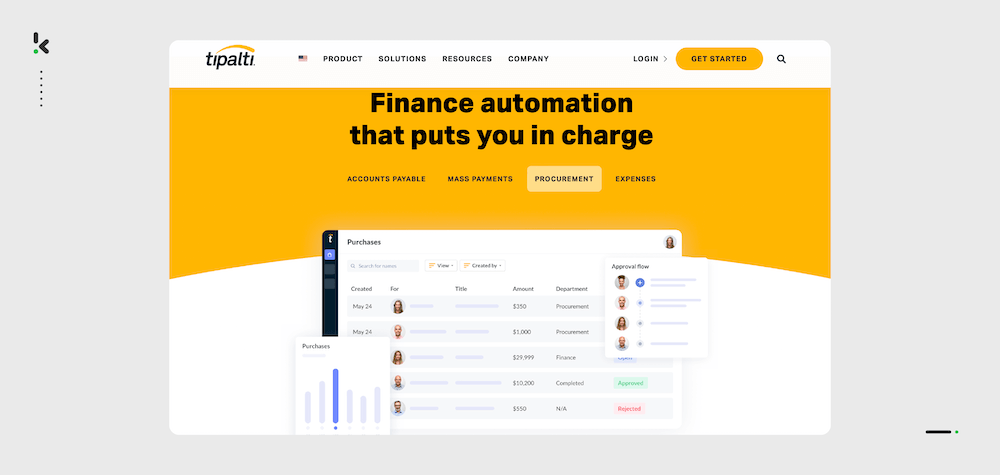

Pros
- OCR for automated invoice processing
- Automated 2-way & 3-way PO matching
- Self-service supplier management portal
- Multi-entity management capability
- International tax information validation, with full compliance with UK and US tax authorities
Cons
- Limited advanced customization options for financial reporting
- Based on customer reviews, the implementation process can be cumbersome, with delays in getting support responses and resolving issues (Capterra)
- Relatively high cost for a basic platform with additional costs for any advanced features
Pricing
- Starter plan: Basic AP platform with supplier portal, from $129/month
- Premium plan: 2- & 3-way PO matching with multi-entity and multi-currency support, custom pricing
- Elite plan: Customized approval rules for purchase requests and budget management, custom pricing
Ideal business type and size: Tipalti is most suitable for medium-sized businesses with complex international payables needs.
3. Sage Intacct
Sage Intacct is a cloud-based accounting software designed to enhance the efficiency of financial operations, particularly in accounts payable and accounts receivable automation.


Pros
- 2-way & 3-way matching for purchase orders, invoices, and receipts
- General ledger with AI-powered anomaly detection
- Visibility and traceability of accounts payable status with real-time reporting
- Flagging of duplicate invoices
- Customizable approval workflows
Cons
- The software may be too expensive for small businesses
- Based on user reviews, although the software offers a high level of customization, tailoring reports and dashboard features can be time-consuming and cumbersome (GetApp)
- Based on client reviews, the initial setup and configuration are complex, demanding considerable time and resources to customize the system to specific business requirements (Capterra)
Pricing
- Pricing information is available upon request, approximate costs often fall between $10,000 to $30,000 annually
Ideal business type and size: Sage Intacct is best suited for medium to large-sized businesses with complex AP processes and extensive customization requirements.
4. Airbase
Airbase is an accounts payable software designed to ease the tasks of financial teams by automating all stages of a transaction, from initial approval to GL sync.
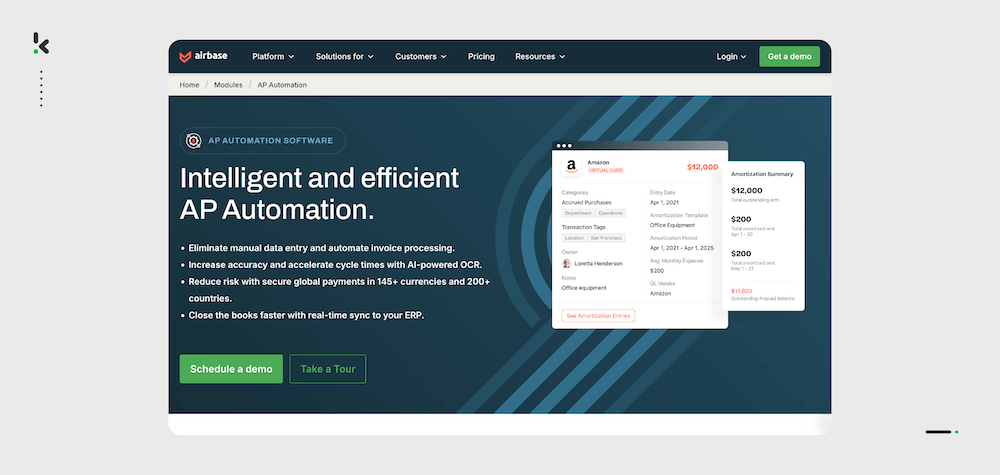

Pros
- Automated 3-way matching of invoices, purchase orders and receipts
- Automated data extraction with AI-powered OCR
- Review and approvals of invoices via desktop, Slack, mobile, or email
- Auto-categorization of expenses then automatic coding, tagging, and recording transactions into GL
- Self-service vendor management portal
Cons
- Limited controls on mobile app
- Based on user reviews, Airbase can be inefficient for companies with multiple legal entities. Users can only manage and view one entity at a time and there is no ability to assign expenses to different entities (TrustRadius)
- Based on user reviews, Airbase lacks customization and depth in reporting functionalities for complex financial analysis. (TrustRadius)
Pricing
- Pricing information is available upon request
Ideal business type and size: Airbase is best suited for mid market companies that do not have a large number of entities.
5. DocuWare
DocuWare is a cloud-based document management solution that enables to digitize, secure and optimize document-related processes.
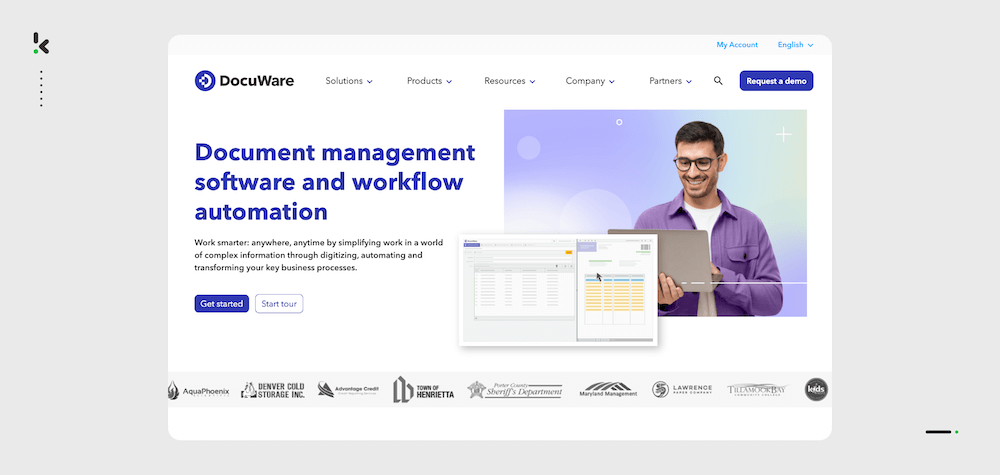

Pros
- Automated matching of paper and electronic invoices to purchase orders
- Automated approval workflows based on predefined rules
- Cloud-based invoice archival
- Invoice validation with duplicate, error and unknown supplier detection
- Integration with popular accounting and ERP software such as SAP, Quickbooks, Sage and DATEV
Cons
- No vendor management tools
- Limited workflow customization features
- No 3-way matching
- Based on customer reviews, DocuWare lacks advanced features and customization options for specific business needs (G2)
Pricing
- Pricing information is available upon request
Ideal business type and size: DocuWare is best suited for small to medium-sized businesses that don’t require extensive customization features.
6. Xero
Xero is an accounting software that is designed to keep track of accounts payables without manual input.


Pros
- Detailed financial reports, including profit and loss statements, balance sheets, and cash flow statements
- Scheduling and payment of invoices in batch
- Inventory and project management
- Multi-currency support for international payments
- Integration with over 800 third-party applications
Cons
- No 2-way or 3-way matching
- Based on user reviews, Xero platform lacks customization features, specifically in the data visualization reports (Capterra)
- Based on client reviews, users need to purchase additional integrations like ApprovalMax and Hubdoc to access functionalities such as document capturing and approval workflows, which are typically available within a single platform (Xero)
Pricing
- Starter plan: Upload of 5 invoices and reconciliation of bank transactions, $29/month
- Standard plan: Reconciliation of bank transactions in bulk, $46/month
- Premium plan: Additional multi-currency support, $62/month
Ideal business type and size: Xero is best suited for small to medium-sized businesses with small receiving invoice volumes.
7. FreshBooks
FreshBooks is an accounting and invoicing software that allows businesses to automate their accounts payable processes.
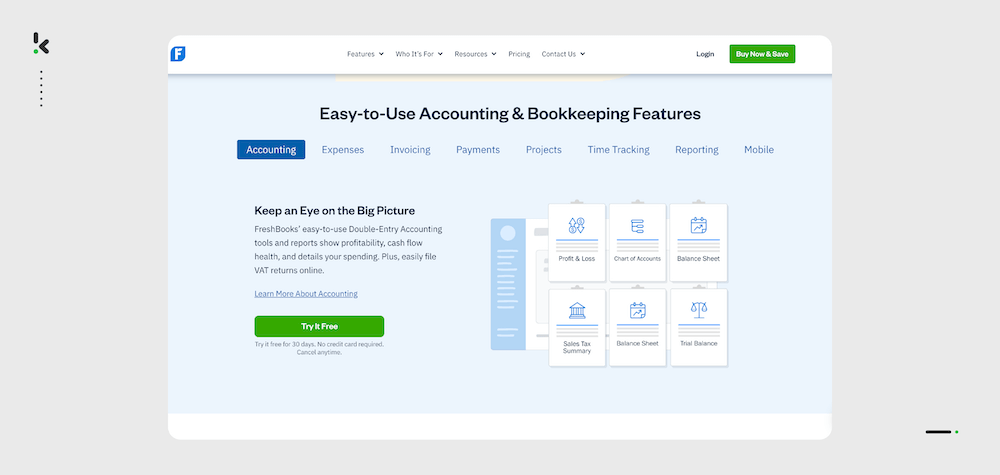

Pros
- Automated bank reconciliation
- Expense and asset tracking
- Generation of cash flow statement and profit & loss report
- Double-entry accounting reports
- At-a-glance performance dashboards
Cons
- No 2-way or 3-way matching
- Accounts payable feature available only in Premium plan
- Limited customization options
- Might be unsuitable for large business with complex financial operations (Forbes)
Pricing
- Lite plan: Unlimited expenses with performance dashboards, $7.60/month
- Plus plan: Double-entry accounting reports and bank reconciliation, $13.20/month
- Premium plan: Accounts payable and project profitability feature, $24/month
- Select plan: Dedicated account manager and customized onboarding, pricing upon request
Ideal business type and size: FreshBooks is best suited for small to medium sized businesses with limited number of vendor transactions and basic AP needs.
While each software offers a range of impressive capabilities, it’s crucial to identify the features that align most closely with your specific needs. Understanding these key functionalities will help you make an informed choice that optimizes your accounts payable processes and supports your business goals.
Features To Look For in AP Software
When selecting accounts payable software, businesses must focus on features that streamline operations, improve accuracy, and enhance financial control. Here’s a detailed list of essential functionalities to consider:
Automation Capabilities
Look for software that automates repetitive tasks like invoice processing, approval workflows, and payment scheduling. Features such as automated invoice capture, validation, and routing can significantly reduce manual effort and minimize errors.
Integration with ERP Systems
Seamless integration with major ERP systems like SAP, Oracle, Microsoft Dynamics, and NetSuite ensures that data flows smoothly between your AP software and other financial tools. This integration facilitates real-time data synchronization, maintains consistent financial records, and streamlines processes by reducing manual data entry.
Invoice Management
Effective AP software should support comprehensive invoice management, including electronic data capture using OCR technology, data extraction, and validation. The software should also offer 2-way or 3-way invoice-matching capabilities to ensure accuracy by matching invoices with purchase orders and receipts before approval.
Approval Workflow Customization
Flexible and customizable invoice approval workflows are essential for ensuring compliance and efficiency. The software should allow you to define workflows based on various criteria such as invoice amount, vendor, and departmental policies, support multi-level approvals for high-value invoices, and offer mobile approval options for managers on the go.
Payment Processing
Efficient payment processing capabilities should support multiple payment methods, including ACH, wire transfers, checks, and virtual cards. The software should facilitate batch payments to save time and provide options for scheduling payments to optimize cash flow and take advantage of early payment discounts.
Vendor Management
A centralized vendor management feature helps maintain accurate vendor information, track vendor performance, and manage vendor communications. This functionality can enhance relationships with suppliers and ensure timely payments.
Reporting and Analytics
Comprehensive reporting and analytics tools provide valuable insights into your AP processes. Look for software that offers customizable dashboards, real-time reporting, and the ability to generate detailed financial reports to help with strategic decision-making.
Security and Compliance
Choose AP software that offers robust security measures such as data encryption, access controls, and audit trails. Additionally, the software should comply with relevant financial regulations and standards, such as the Sarbanes-Oxley Act (SOX), General Data Protection Regulation (GDPR), and ISO 27001 standard.
When selecting AP automation software, focus on features that meet your current business needs and accommodate future growth. Carefully evaluate each feature and consider how it integrates with your overall financial processes.
Conclusion
Choosing the right accounts payable software depends on prioritizing features that align with your business needs. While we featured some of the best AP software in 2025, we believe that Klippa SpendControl offers everything you need to take complete control of all your business expenses while saving precious time and costs on vendor invoice processing.
FAQ
The AP (Accounts Payable) system is a structured process used by businesses to manage and record their liabilities for outstanding invoices from suppliers. It typically involves tracking invoices, obtaining approvals, and scheduling payments while ensuring accuracy and compliance with financial regulations. Modern AP systems often leverage automation for efficiency.
Accounts payable software like Klippa SpendControl is used to automate invoice management, payment scheduling, and vendor communications. These tools help businesses reduce manual work, improve accuracy, and enhance financial control.
The top AP automation software includes Klippa SpendControl, Tipalti, and Airbase, which offer advanced features like OCR for data extraction, 3-way matching, and seamless ERP integration. Each software is tailored to different business sizes and needs, making it essential to evaluate the options based on your requirements.
While Excel can be used for basic accounts payable tasks like tracking invoices and payments, it lacks the automation, accuracy, and scalability of dedicated AP software. For businesses handling larger volumes of invoices, specialized AP software is a more efficient and reliable choice.
The accounts payable processing system is the workflow businesses use to manage supplier invoices, approvals, and payments. It involves capturing invoice data, validating it against purchase orders, routing it for approval, and ensuring timely payments. Modern processing systems use software to streamline these tasks, reduce errors, and improve financial visibility.